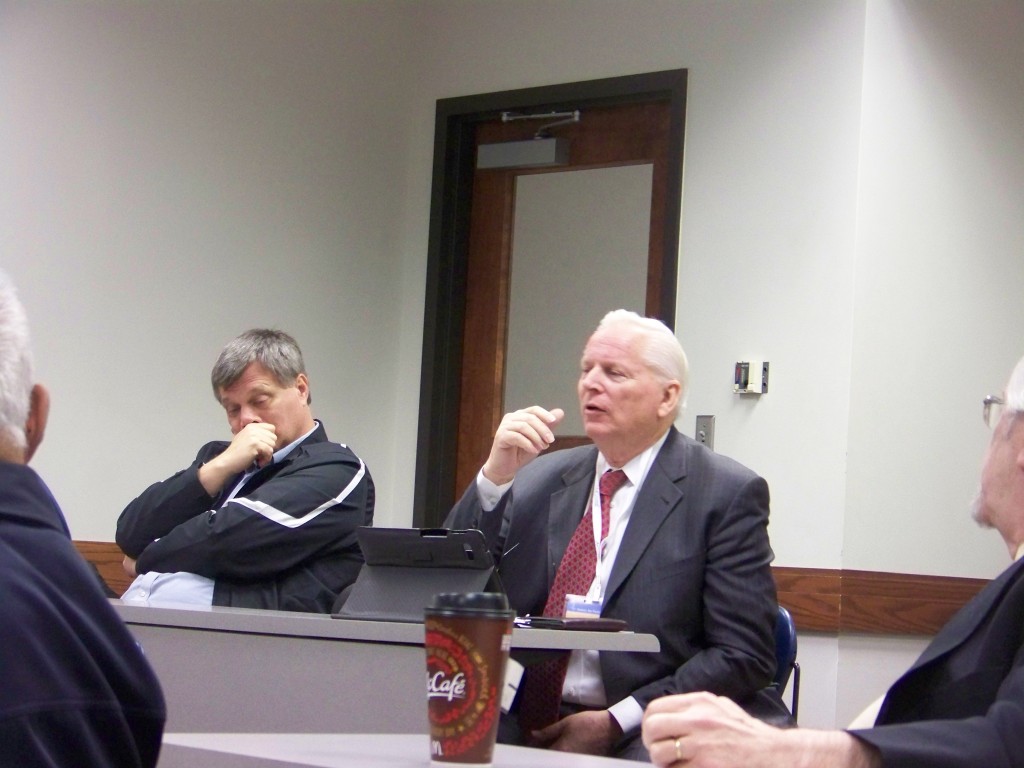| January 15, 2003 |
1 comment
PneumaReview.com: Why should Pentecostal/charismatics be involved in ecumenical dialogue?

Mel Robeck (center), during a discussion on ecumenism, at the 2014 meeting of the Society for Pentecostal Studies.
Mel Robeck: I am convinced that most of our real differences do not so much lie where we say they do, that is, in our various theological positions. Yes, our doctrinal differences are sometimes deep and they are very real. But our most substantive differences lie in a history packed with personal relationships that have been broken, in the misinformation that has been sown between us, in our differing sociologies and social locations, in our unwillingness to admit that during our time of division the other could have changed, or that God could be working among them when they strive toward some form of visible unity. All too often, we seem to have a psychological need to be “right”—that is, to be in control.
For the sake of mission alone we need a united witness to the reconciling power of the Gospel.
Pentecostal/charismatics do have a right to critique both the theology and practice of other Christians, but we would not be genuine if we did not also affirm the right of others to critique ours. What we don’t have is the right to reject interaction or participation with them out of hand. We have the responsibility to challenge them to greater levels of conformity to the Word of God, but we don’t have the right to disinherit them as our siblings, our brothers and sisters “in Christ.” Our unwillingness to take up this responsibility leaves “them” without the gifts that God has given to us for the Church and it leaves “us” without the gifts that God has given through them for the Church. We really do need one another, and we all suffer because of our unwillingness to admit that simple fact. What is extremely sad to me is the fact that all too often we criticize “them” for not exhibiting the very things that “we” view as our strengths. “We” withhold from “them” what God has given to “us.” By doing this, “we” condemn “them” to failure when “we” could be “their” source of healing. In the end, I believe that “we” will be held accountable for what we refuse to offer to “them” that would enable “them” to be whole, and “we” will be held accountable for what “we” refuse to accept in the help that the Lord offers to “us” through “them.”
In their “Decree on Ecumenism” (Unitatis Redintegratio, 1), the Bishops of the Roman Catholic Church who gathered in Rome for the Second Vatican Council made a very important assertion.
Christ the Lord founded one Church and one Church only. However, many Christian communions present themselves to men as the true inheritors of Jesus Christ; all indeed profess to be followers of the Lord but they differ in mind and go their different ways, as if Christ himself were divided. Certainly such division openly contradicts the will of Christ, scandalizes the world, and damages that most holy cause, the preaching of the Gospel to every creature.
“Endeavoring to keep the unity of the Spirit in the bond of peace” Eph. 4:3
If the divisions of the Church truly hold such implications for the proclamation of the Gospel that we are called to share with the world (Matthew 28: 19-20), and which we lift up as one of our reasons for being, then it is important for our congregations and denominations to work at those things that divide us from one another. One way for this to happen is for Christians of good will, who are troubled by the current state of affairs, to sit down with one another and talk about their differences. Essentially, that is all that ecumenical dialogue is. Dialogue can help us to understand one another. It can help us to clear out the “dead wood” that separates us. It can help us to acknowledge our differences. It can help us to plan how to move forward together.
Page 2 of 9«12345...»Last »
Tags: churches, ecumenism, featured, interview, mel, pentecostalcharismatic, robeck
Category: Ministry, Winter 2003



